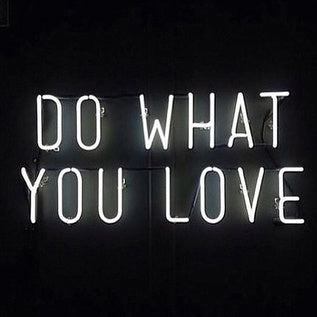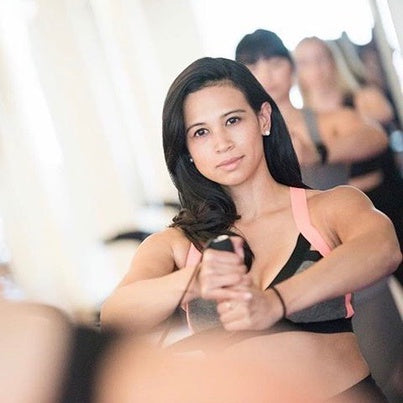
21.02.18
HOW TO TURN YOUR PASSION INTO A FULL-TIME JOB
Whether you spend your free time crafting jewelry, dreaming up a new line of snacks (hey, we’ve been there!) or working on a future best-selling novel, the activities we pursue outside of our full-time job say a lot about our true passions. Of course, if you’re inspired by your full-time job—lucky you. But for many of us, our hobbies leave us truly fulfilled.
If this is the case, have you ever considered turning your side hustle into your 9-to-5? While it’s easy to spend hours daydreaming about this possibility, it’s much harder to quit your current gig, craft a business plan, go back to school, leave a cushy salary, switch industries, or even figure out the best first step. We spoke with English Taylor, a former corporate content marketer who recently started her own freelance writing business, to get her insider tips on turning your passion into a full-time job.

SS: Congratulations on starting your own business! Tell us more about what you used to do and what you’re currently doing.
ET: Thank you! I used to work in marketing for various startups in San Francisco. Now I’m running my own freelance writing business. I help various brands and publications, primarily in the women’s health space, with articles and blog posts. Some of my clients are LOLA, THINX, Schmidt's Naturals, BINTO, Equinox, Apartment Therapy, and Modern Fertility.
SS: Has writing always been your passion?
ET: I’d say that women’s health and wellness is my passion. But I am skilled in writing and really enjoy it. I went back to graduate school to study marketing. I happened to take a few journalism courses—it’s helpful to be a strong writer if you want to work in marketing or communications. My journalism professor encouraged me to send my final project, a long-form article, to The Atlantic. They published it! Because of that piece’s success, I started freelance writing for Refinery29 and NYLON just for fun and to make some extra cash.
I kept up this side hustle for nearly five years while working various marketing gigs. It was so fun to write about nutrition, sex, fitness, and beauty—all things I love—and just happen get paid for it. I remember working on stories at my full-time job instead of doing work.
SS: Was there a moment or point when you knew you wanted to quit your former job?
ET: I guess you could say I had a quarter life crisis of sorts. I realized I was spending twelve hours a day working for a company and in a profession that I just wasn’t excited about.
When your personal values and interests aren’t aligned with how you’re spending your time, that’s when things go south. I knew I had to do something else, otherwise my physical, emotional, and mental health would suffer. To be honest, they already were.
One night during this rough patch, my partner gifted me a journal. The cover said, “Trust your crazy ideas.” I had been toying with turning writing into a full-time gig. This sweet gesture made me feel more supported and confident. I decided that night that I was going to quit.
SS: Was it difficult to quit? What was the hardest part?
ET: It was very difficult. I’m incredibly risk-averse. The hardest part for me was letting go of what other people thought. I remember not being able to sleep because I was afraid of what my coworkers would think and how they would react. Fortunately, I have a very supportive partner, group of girlfriends, and family. Surrounding myself with them the week I quit and during the transition was vital. Most of my coworkers were happy for me, anyways, so I’m not sure why I was anxious.
SS: Describe the process of turning your side hustle into your full-time job—I’m guessing it didn’t happen overnight.
ET: Ha! No, it didn’t. Because this was my side hustle for a few years, I had formed long-term relationships with some editors. When they found out I was available to work with them more frequently, they immediately assigned me more stories and connected me with editors at other places.
I also created a massive Excel spreadsheet with a list of nearly 300 publications and brands I wanted to write for. I sent cold emails and pitches to respective editors or content managers, whose email addresses I found through a lot of Internet stalking. Many of these publications are now places I regularly write for, like THINX and Apartment Therapy.
SS: What’s the most challenging part of working for yourself?
ET: I’m an introvert and now have more energy than ever, but the isolation and loneliness can be hard. I don’t miss long days interacting with coworkers in back-to-back meetings, but I do miss being around people. Working at coffee shops has prevented me from going crazy!
I’d say another challenging part is wearing so many hats. I don’t have a finance background, for example, so figuring out things like taxes, cash flow, expenses, and my rates is tough. And gosh, navigating the healthcare system as an independent professional is beyond complicated and frustrating.
SS: And the most rewarding?
ET: In terms of working for myself, the most rewarding part are the rare moments I have time to look at what I’ve built. Like, holy crap, you’ve built a successful business by yourself. That’s pretty cool.
In terms of what I do, reading the comments on my articles makes me feel so fulfilled. I recently wrote an article about menopause. A woman commented that it helped her feel less alone and that she was happy publications were addressing this stigmatized topic. That feels rewarding in a way that I’ve never experienced before.


We Went Grocery Shopping With a Natural Chef and Nutrition Consultant
When we’re making our weekly round at the grocery store, we often find ourselves debating if we should toss a certain item in the cart. Anyone els... READ MORE

How to Keep Your Wellness Routine During Wedding Season
Spring has officially sprung. We love filling our vases up with seasonal daffodils and filling our refrigerator door up with wedding invitations. ... READ MORE

What This Pilates Instructor Eats to Stay Energized All Day
It’s one thing to be in class with your favorite fitness instructor, carefully watching, listening, and following their every cue. But what if you... READ MORE
